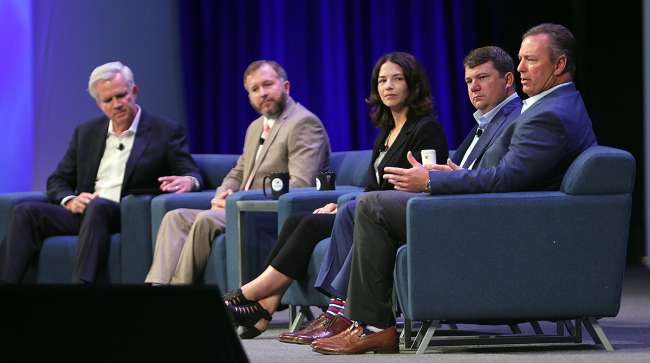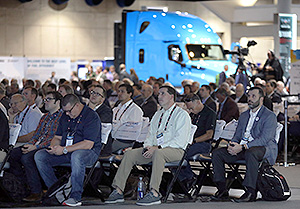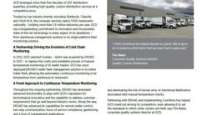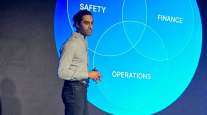Staff Reporter
Fleet Executives Stress Corporate Culture as Recruiting Tool

[Stay on top of transportation news: Get TTNews in your inbox.]
SAN DIEGO — The future of trucking will mean managers will be tasked with sifting through a lot of data at the same time the industry turns to artificial intelligence, according to a panel of transportation officials.
The current point in trucking history is unprecedented, according to Anna Faford, vice president of strategy for C&K Trucking, a Chicago-area drayage firm, with new technologies feeding managers more data than ever.
“It’s almost a data overload for some companies,” Faford said to an audience of about 300 during the “Leaders on the Cutting Edge” panel Oct. 8 at American Trucking Associations’ Management Conference & Exhibition. “There are some new tools that companies can use to pull it together. Visual analytic tools … have really helped us pull from multiple sources.”
Faford said the tools allow managers to reference visual dashboards that filter information and highlight trends, helping managers to make better decisions.
Faford said the industry’s driver shortage will mean companies will have to push harder to make their existing drivers more productive.
“You have to find a way to still move that freight,” Faford said. “Matching freight, being more productive, getting that driver’s day to be its best possible and meeting your customer’s expectation is just going to be increasingly important as the years go on.”
Continuing education also will be, said another panelist, and thanks to technology, it’s easier.
J.B. Hunt Transport Inc. Chief Operations Officer Craig Harper said workers should be encouraged to learn, using easy-to-access tools such as podcasts and YouTube.
“If you are not continuing to advance your learning, you are falling behind,” said Harper, the panel’s moderator. “Because I promise you, your coworker or your competitor is doing so.”

The audience listens to the "Leaders on the Cutting Edge" speakers. (John Sommers II for Transport Topics)
Technology also is converging to create combinations that become useful to trucking and other industries, Harper said. One example is the smartphone, which allows drivers to access load-matching applications on the internet.
The internet also is providing transparency to the trucking industry, allowing drivers to rank the quickest and fastest places to unload, Harper said.
The panelists also discussed how to keep a company sustainable and agreed sustainability started with corporate culture.
Jeff First, vice president of Northwest Regional Operations at FedEx Freight, said important strategic initiatives have to focus on recruiting talent and employee retention.
“Culture is that bedrock,” First said. “People want to feel connected to an organization.”
But First said it’s not just about the culture inside the firm.
“It’s also how people perceive your brand outside of your organization,” he said.
The perceptions are key because they affect who applies to work at your company, First said.
Regarding culture, Faford said it is crucial drivers feel safety and customer satisfaction are priorities, thus making the company sustainable.
“They are really my eyes and ears,” Faford said. “They are my boots on the ground. Without them, you just don’t have a successful business.”
Want more news? Listen to today's daily briefing:





